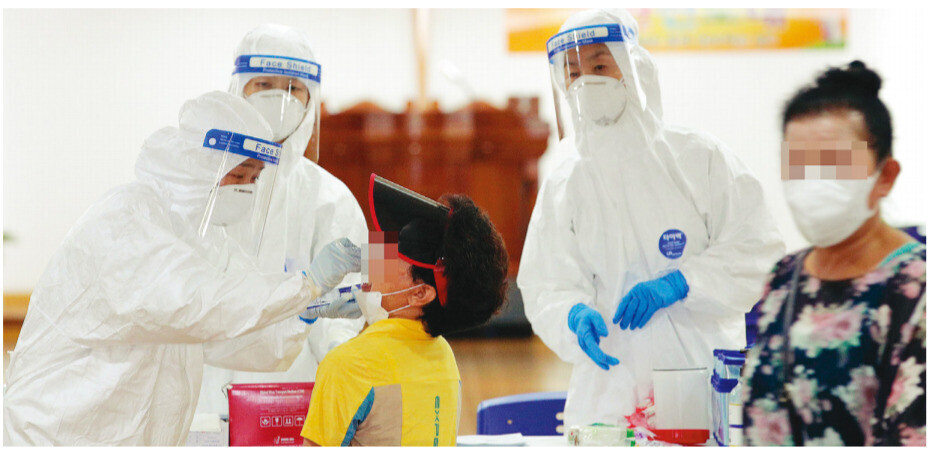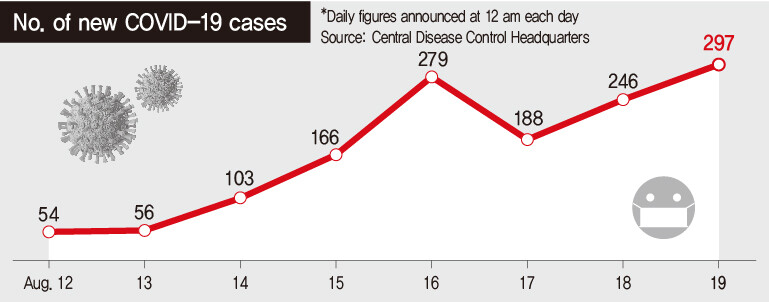hankyoreh
Links to other country sites 다른 나라 사이트 링크
S. Korea records over 1,200 COVID-19 cases over past 6 days

The number of South Koreans diagnosed with COVID-19 has been rising rapidly as nearly 300 tested positive on Aug. 19. With 200 patients over the past two weeks diagnosed without clear transmission routes and a number of cases emerging in connection with a heavily attended rally in Seoul’s Gwanghwamun Square on Aug. 15, observers are predicting the upward trend will continue for some time.
The Korea Centers for Disease Control and Prevention (KCDC), recorded 297 new cases at 12 am on Aug. 19. The country has seen over 1,200 cases in the past six days alone. As of noon on Aug. 19, the cumulative total of patients connected with Sarang Jeil Church in Seoul’s Seongbuk District -- the epicenter of the most recent outbreak -- had swollen to 623. In a regular briefing that day, Central Disaster and Safety Countermeasures Headquarters (CDSCHQ) General Coordinator Kim Kang-lip, vice health minister, said, “In the Greater Seoul area, there is a risk of being infected with the COVID-19 virus anywhere and at any time.”
“We see this week as representing a major crossroads that determines whether there’s a large nationwide spread or whether things can be brought under control,” he added.
Cases connected to Sarang Jeil Church expected to sharply increase for some timeHowever, many see the upward trend in diagnoses as unlikely to stop anytime soon. To begin with, a number of secondary and higher-degree transmissions have been emerging in connection with Sarang Jeil Church. According to KCDC data as of noon on Aug. 19, patients diagnosed from Sarang Jeil Church were connected with 114 locations either through work, travel, or residence. The locations were also diverse in nature, including four call centers, 44 general workplaces, 10 social welfare facilities, nine healthcare institutions, and five religious establishments.

A total of 50 patients have been diagnosed with secondary transmission of the virus in 11 of the locations, including Antioch Church in Seoul’s Nowon District (18) and a Lotte Home Shopping Shinhan Life Insurance call center (10). Twenty-two cases of secondary transmission were counted among churches alone, prompting KCDC Vice Director Kwon Jun-wook to call on all churches outside the Seoul Capital Area (SCA) to also “take equivalent measures to the SCA, including online services.” Another 1,000 or so people who are subject to mandatory testing have either refused to comply with disease control authorities’ testing requests or have been difficult to identify or locate, leading observers to predict additional diagnoses going forward.
Disease control authorities are predicting a likelihood of secondary and higher-degree transmissions increasing sharply in connection with Sarang Jeil Church during the second half of the week.
“If we consider that most patients start emerging around five to seven days after being exposed to the virus, this coming weekend is likely to be the first crossroads as the numbers continue to grow,” Kwon said.
A number of patients have also tested positive after attending the Gwanghwamun rally on Aug. 15. As of noon on Aug. 19, at least 10 patients nationwide had been diagnosed not only in the SCA but in North Gyeongsang Province, Busan, and South Chungcheong Province.
Rise of cases with no clear transmission routesThe patients had no connection to Sarang Jeil Church, which means the fears of additional infections occurring through contact at the rally have become a reality, disease control authorities said, adding that the 10 individuals in question had all voluntarily visited screening clinics to undergo testing and that the number is likely to grow in the days ahead. Over 600 patients diagnosed between Aug. 12 and 19 had no connection with Sarang Jeil Church.
Another factor driving up the number of patients is the accumulation of “mystery cases” with unclear transmission routes. Between Aug. 6 and 19, the number of such mystery cases stood at 220, or 13.7% of 1,602 cases.
“The daily number of new patients testing positive would have already passed 400 if the Sarang Jeil Church members had been more cooperative about testing. Rightly, the numbers are coming very slowly,” said Eom Joong-sik, a professor of infectious diseases at Gachon University Gil Medical Center.
“With numerous cases of unclear transmission routes in different regions through unclear routes, the [daily new patient numbers in the hundreds] are likely to continue for some time,” Eom predicted.
Im Seung-gwan, director of Gyeonggi Provincial Medical Center Ansung Hospital and co-director of the Gyeonggi Province COVID-19 emergency countermeasures team, said, “Based on the mystery cases that have been occurring, the current trend is likely to continue unabated for the next two weeks until the effects of Level 2 social distancing begin to appear.”
By Choi Ha-yan, Park Da-hae, and Kim Yang-jin, staff reporters
Please direct comments or questions to [english@hani.co.kr]

Editorial・opinion
![[Column] When ‘fairness’ means hate and violence [Column] When ‘fairness’ means hate and violence](https://flexible.img.hani.co.kr/flexible/normal/500/300/imgdb/original/2024/0516/7417158465908824.jpg) [Column] When ‘fairness’ means hate and violence
[Column] When ‘fairness’ means hate and violence![[Editorial] Yoon must stop abusing authority to shield himself from investigation [Editorial] Yoon must stop abusing authority to shield himself from investigation](https://flexible.img.hani.co.kr/flexible/normal/500/300/imgdb/original/2024/0516/4417158464854198.jpg) [Editorial] Yoon must stop abusing authority to shield himself from investigation
[Editorial] Yoon must stop abusing authority to shield himself from investigation- [Column] US troop withdrawal from Korea could be the Acheson Line all over
- [Column] How to win back readers who’ve turned to YouTube for news
- [Column] Welcome to the president’s pity party
- [Editorial] Korea must respond firmly to Japan’s attempt to usurp Line
- [Editorial] Transfers of prosecutors investigating Korea’s first lady send chilling message
- [Column] Will Seoul’s ties with Moscow really recover on their own?
- [Column] Samsung’s ‘lost decade’ and Lee Jae-yong’s mismatched chopsticks
- [Correspondent’s column] The real reason the US is worried about Chinese ‘overcapacity’
Most viewed articles
- 1China calls US tariffs ‘madness,’ warns of full-on trade conflict
- 2[Column] US troop withdrawal from Korea could be the Acheson Line all over
- 3[Editorial] Yoon must stop abusing authority to shield himself from investigation
- 4[Column] When ‘fairness’ means hate and violence
- 5[Column] How to win back readers who’ve turned to YouTube for news
- 6US has always pulled troops from Korea unilaterally — is Yoon prepared for it to happen again?
- 7[Book review] Who said Asians can’t make some good trouble?
- 8Naver’s union calls for action from government over possible Japanese buyout of Line
- 9Could Korea’s Naver lose control of Line to Japan?
- 10[Editorial] Korea must respond firmly to Japan’s attempt to usurp Line